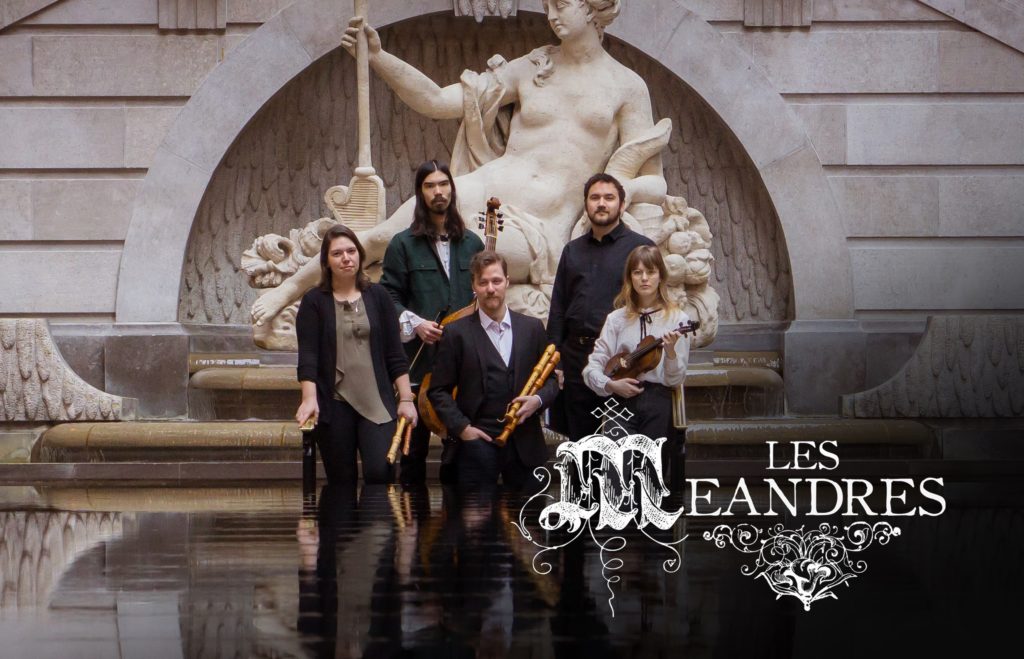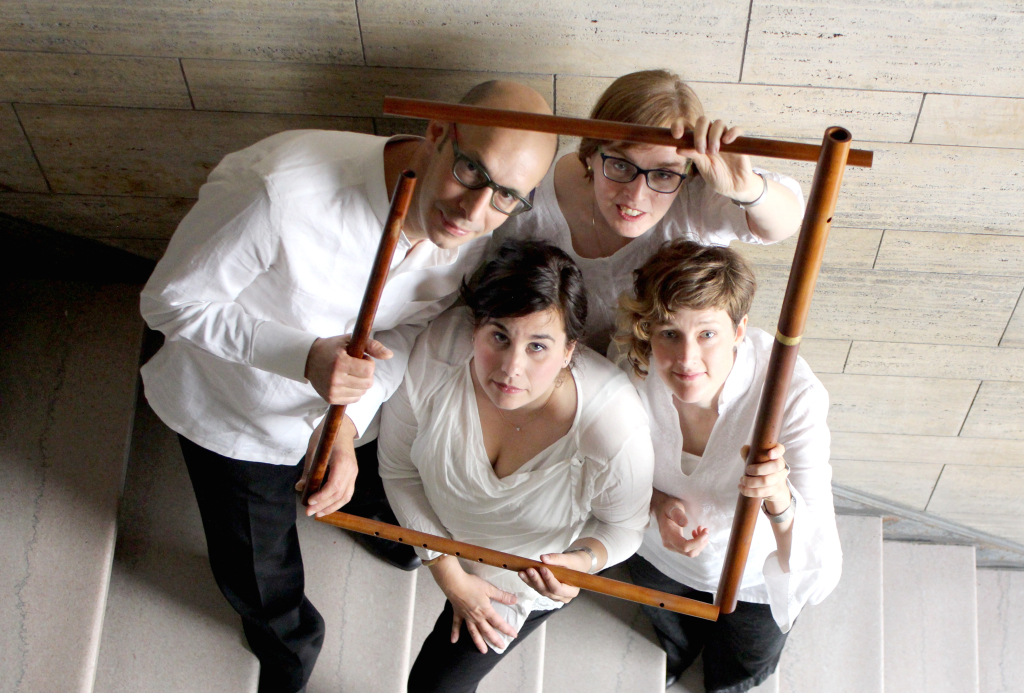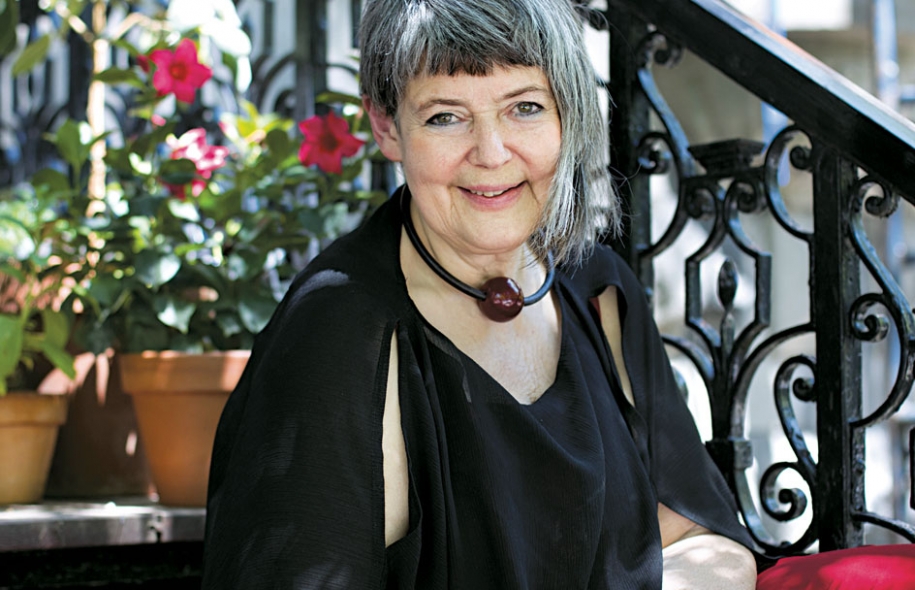Qui êtes vous? Parlez-nous de votre activité/métier.
Who are you? Tell us about your work and activities.
Jérémie de Pierre : Je suis originaire du village de Mont-Saint-Michel dans les Laurentides, mais j’ai grandi à Ferme-Neuve. Après quelques balbutiements au violon, je me suis consacré à la flûte à bec. J’ai interrompu mon parcours musical pour 3 ans d’études en théâtre avant de me dédier à la musique ancienne.
J’ignore toujours si on dit “Flûtiste à bec” ou “Flûtabequiste”…
Justin Luchinski: I’m Justin Luchinski, harpsichordist of Les Méandres, student of Hank Knox at McGill University. Though born in Saskatoon, I spent the majority of my life in Calgary, Alberta, where I learned to play piano, the drums, guitar, and bass in a very musical family. I’ve been told the path that’s led me to my current position is an unusual one, as I spent most of my performing career behind a drum kit or with a bass guitar over my shoulder, playing a wide variety of genres from rock ‘n’ roll, jazz, gospel, funk, to rockabilly, punk rock, metal. Since discovering early music relatively late in my life, there hasn’t been a sliver of doubt in my mind that I’ve found exactly what I’ve been looking for.
These days, aside from the fantastic repertoire I’ve had the pleasure of performing in Les Méandres concerts, I’ve been immersed in the early operatic world, performing in Handel’s “Rodelinda,” “Alcina,” and “Ariodante” all within the last year and a half with Opera McGill, and very recently directing the music for Thomas Arne’s 1760 dramatic pastoral opera “Thomas & Sally.”
Why are you a musician?
Pourquoi êtes-vous musicien(ne)?
Jérémie de Pierre : J’ai toujours eu l’impression que j’avais commencé le violon avec ma grande sœur parce que c’était son idée. Mais il semblerait que ce soit moi qui ait demandé à mes parents de suivre des cours de musique. En tout cas, je n’en ai aucun souvenir !
Je pense que j’aime la musique parce qu’elle est une discipline à la fois physique et intellectuelle. Nos capacités d’analyse et de réflexion sont sollicitées. C’est un discours où il faut avoir de l’éloquence mais aussi savoir écouter et laisser la place à ses collègues. On doit en connaitre la grammaire, se référer à la Littérature et à l’Histoire. D’un autre côté, il faut ressentir les cadences, les hémioles, le rythme, avoir du souffle, une bonne posture. C’est un travail d’équipe et un merveilleux mariage entre deux mondes.
Justin Luchinski : For nearly as long as I can remember, music is the one thing I’ve consistently known would be a great part of my life. It’s never been a question of whether I would be a musician but rather a question of how to satisfy the unyielding curiosity and necessity to understand and improve.
Racontez-nous deux souvenirs, un heureux et un désagréable/embarrassant?
Tell us two memories, one happy and one unhappy or embarrassing about your musical life.
Jérémie de Pierre : Je suis content de voir que j’aurais 1000 souvenirs heureux à partager, mais que j’ai de la difficulté à trouver un souvenir désagréable. C’est bon signe je crois !
Dans mon village, le chef de la chorale était un homme audatieux. Une année, je devais avoir 11 ans, il a décidé de mettre sur pied un programme de musique ancienne. La chorale était quelque chose de sérieux pour moi parce que ma mère était chef de pupitre des soprani. J’avais été très impressionné par les musiciens de “la Grand ville” qui étaient venus accompagner la chorale. Je me suis mis à espérer que j’aurais un jour la chance de jouer avec eux. Pendant mes pratiques dans ma chambre à la maison, je m’imaginais qu’ils étaient autour de moi et qu’on faisait de la musique ensemble. L’année suivante, le chef de la chorale me demandait au téléphone si je pouvais jouer dans la Messe de Minuit de Charpentier avec mes idoles. Je pleurais de joie.
Un souvenir désagréable? Mon premier Masterclass avec Piers Adams. Mon anglais a longtemps été très limité et je me retrouvais en première année de Cégep en flûte à bec, à la Maison des Jeunesses Musicales du Canada, devant plein d’inconnus, à recevoir un cours dans une langue que je ne comprenais pas. J’ai freezé comme on dit. J’ai une haine profonde pour le compositeur Veracini depuis!
Justin Luchinski: I’m not sure why this comes to mind as a happy memory—I guess it was more funny than stressful at the time. During one of the nights of Opera McGill’s production of Alcina, there was a scene that involved leaves falling off living, breathing trees. It looked amazing! But half way through an aria, I was playing the bass line with one hand and half-standing, reaching into the strings and pulling a good number of fallen leaves out that were dampening some of my notes. We had a good chuckle about it afterwards.
The first embarrassing memory that comes to mind involves a twelve-year-old me playing a Roland TD-10 drum kit at a school assembly with a little three-piece cover band. There was an audience of about 350 people. The kick drum on those small electric Roland drum kits is no more than a pedal with a pad the size of a hockey puck, and there are two small spikes at the bottom that are meant to press into a carpet to keep the pedal from moving while kicking it. We were on a very small, wooden, two-foot high stage with no carpet. We were right in the middle of playing “I Love Rock ‘n’ Roll” by Joan Jett & The Blackhearts when my “kick drum” slid right off the stage and fell crashing to the floor. I played the remainder of the song by stomping my foot as loudly as I could on the stage, and I guess it kind of worked, though the effect was a little different.
Tell us about your first concert as an ensemble?
Jérémie de Pierre : Le concert s’intitulait Le Ballet de Tircis. À l’origine, c’était le nom de l’ensemble. J’ai finalement trouvé Les Méandres pendant ma douche.
Pour le premier concert, nous avions une sélection assez éclectique de pièces. Ça allait de la chanson du 16e siècle au quatuor de Telemann. C’était un peu décousu, mais plein de ferveur. Un peu comme une grande lettre d’amour à la musique ancienne que j’aurais pris 20 ans à écrire.
Mais je me souviens surtout du stress!
Votre relation personnelle à la musique? Quelle(s) musique(s) écoutez-vous?
Your personal relationship to music? What music(s) do you listen to?
Jérémie de Pierre : J’écoute beaucoup de musique. En cuisinant, en me rendant au travail… n’importe quand en fait. Adolescent, je choisissais un disque pour l’associer à un roman. Par exemple, Carmina Burana de L’OSM avec Dutoit, c’est le Capitaine Nemo et le Nautilus pour moi. Le concerto RV 108 c’est le Comte de Monte-Cristo. Je regrette par contre de ne plus trouver le temps de m’assoir et d’écouter un disque comme avant. Je suis également critique des plateformes d’écoute. C’est bien gentil, mais j’ai besoin du livret! Donnez-moi le livret!
Pour ce que j’écoute, c’est 99.5% du temps de la musique ancienne. Quelque rares fois je vais écouter Tom Waits, Iron Maiden, Gentle Giant, Rush, The Chieftains ou Mingus pour en citer quelques-uns.
Racontez-nous la chose la plus ridicule qu’il vous est arrivé pendant un concert/une tournée?
What was the weirdest thing to happen to you during a concert or on tour?
Jérémie de Pierre : Un classique. On jouait une de mes compositions dans un concert au Cégep. J’étais tellement nerveux, je n’arrêtais pas de rappeler à tout le monde d’avoir leurs partitions avec eux. Évidemment c’est quand j’arrive à mon lutrin que je me rends compte que je n’ai pas les miennes.
Votre premier contact avec la musique ancienne?
Your first encounter with early music?
Jérémie de Pierre : Je ne sais pas. Je me souviens que j’écoutais beaucoup de classique quand j’étais enfant. Je ne sais pas trop si je me suis mis à aimer la musique ancienne parce que je jouais de la flûte à bec ou l’inverse. Mais je me souviens que je commençais à me rendre compte que Vivaldi et Bach n’étaient pas la même chose que Mozart ou Beethoven. Mon premier achat d’un disque de musique ancienne, c’était soit un disque de Folia de Jordi Savall ou un disque d’œuvres pour viole de Gambe de Telemann par Lorenz Duftschmid.
Justin Luchinski: I remember walking out of an HMV in 2012 with a J.S. Bach “greatest hits” type of album, knowing next to nothing about music pre-19th century. Expecting to hear piano concertos or something of the sort, I was instead pleasantly surprised to find recordings of such artists as Gustav Leondardt and Sigiswald Kuijken, and was then first introduced to the sound of the harpsichord (outside of an Addams Family or Simpsons Halloween Special context). Several weeks later, I discovered Hank Knox’s Frescobaldi albums Affetti cantabile and Oeuvres pour clavier that feature a stunning 1677 harpsichord set to quarter-comma meantone. I’ve been hopelessly hooked ever since.
A motto for NovAntica?
Une devise pour NovAntica?
Jérémie de Pierre : Défricheur de terrains connus.
What can NovAntica contribute to Montreal musical life?
Jérémie de Pierre : C’est important de rassembler nos efforts afin d’assurer la pérennité de nos liens avec le public. On est tellement chanceux à Montréal! Il y a quoi … 1000 ensembles de musique ancienne, chacun avec une personnalité, une approche unique, une proposition digne d’intérêt. En plus, il y a un public fidèle qui ne sait plus où donner de la tête, tellement il y a de concerts à voir! Je voudrais voir NovAntica devenir LA référence pour tout ce qui touche à la musique ancienne au Québec. Mettre sur pied un calendrier des évènements, avoir une billetterie pour prendre les réservations, permettre la publicité entre les ensembles etc.
Un lieu, une bonne adresse, un bon livre, un film à voir ou votre disque du moment?
A place, a good spot, a good book, a film to see, or your CD of the moment?
Jérémie de Pierre : Un bord de lac, L’Art de la Guerre de Machiavel. Pour les disques, Cœur du Poème Harmonique et Amadis par Les Talens Lyriques.
Quel est votre resto préféré pour les repas après-concert?
What is your favorite place to go to eat or drink after a concert?
Jérémie de Pierre : Le Barbare était l’endroit par excellence. Je suis encore à la recherche la perle rare depuis sa fermeture. L’Amer à boire c’est dans les bonnes places.




